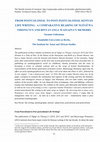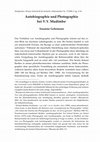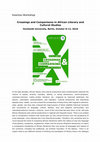Papers by Susanne Gehrmann

The Nairobi Journal of Literature, 2022
The publication of three volumes of memoirs by of Ngũgĩ wa Thiong'o between 2010 and 2016: Dreams... more The publication of three volumes of memoirs by of Ngũgĩ wa Thiong'o between 2010 and 2016: Dreams in a Time of War, In the House of the Interpreter and Birth of a Dream Weaver, has been a major literary event for Kenyan and Eastern African literature. In his seventies, Ngũgĩ joins other postcolonial authors of the first and second generations who have preceded him, in publishing an autobiographical serial on childhood, identity formation and the issue of becoming a writer in colonial contexts and on the verge of formal decolonization. As representative of the Kwani generation of Kenyan writers, Binyavanga Wainaina, aged only 40, offers an early autobiographical text, One Day I will write about this Place in 2011, followed by its lost chapter "I am a homosexual, mum" in 2014. His was a major literary event, too. In my paper, I propose to examine the continuities and ruptures in life writing, and how the thematic, stylistic and ideological choices of Ngũgĩ's and Wainaina, who are both widely read global authors of the present, differ. As I go along the lines of language, class and Bildung; collective trauma and individual depression, the relation to the nation, pan-Africanist and hybrid culture as well as the issue of becoming a writer, I question whether Wainaina's narrative should still be termed postcolonial life writing in the same sense as Ngũgĩ's. By observing that in many ways, Wainaina's text moves away from Ngugi's classical postcolonial stance, I argue that he inaugurates what we canby lack of a better term for nowmomentarily name a postpostcolonial autobiography.

Tydskrif vir letterkunde, 2022
The world is a bar: Fiston Mwanza Mujila's writing beyond 'Africa' Taking recent debates on 'How ... more The world is a bar: Fiston Mwanza Mujila's writing beyond 'Africa' Taking recent debates on 'How to write Africa' in general and the allegations of sexism in Fiston Mwanza Mujila's novel Tram 83 in particular as a starting point, I analyze three texts by the Austria-based Congolese author in this article. Considering the scope of each text, namely Tram 83 (2014), the play Zu der Zeit der Königinmutter (The Times of the Queen Mother, 2018), and the latest novel La danse du vilain (The Dance of the Villain, 2020), shifting images and meanings of gender dichotomies are explored alongside Mujila's aesthetic literary devices. The article is structured around the omnipresent setting of bars that develop from a disputable 'African' bar in Tram 83 to a radically global bar in Zu der Zeit der Königinmutter and to referentially set bars of Central Africa's postcolonial history in La danse du vilain. I argue that recurrence of the bar as a focal lieu of mingling people in Mujila's writing underlines its function as satirical microcosm that goes beyond a realistic representation of the Democratic Republic of the Congo. Multilayered cultural references in Tram 83 and Zu der Zeit der Königinmutter construct the setting into a worldly space whereas La danse du vilain privileges a historical approach. As further pointed out, the metatextual level that is woven into the texts comments on the difficulty of the adequate representation of 'Africa' and the pitfalls of the global literary market place.

Africa today, 2018
New media and African literatures are in a constant dialogue.
While digital space offers new poss... more New media and African literatures are in a constant dialogue.
While digital space offers new possibilities for the world-
wide circulation of literature, new media formats have
become important elements of intermedial writing. This
essay analyzes contemporary examples of genre innovation
in African romance and chick-lit novels, focusing on the use
of new media forms. The concept of remediation serves as a
theoretical starting point. Not only does digital space remedi-
ate previous media, but the novel in its classical book format
remediates new media as well. Through a cross-reading of
two novels that rely on a plot of romance—Cunie by the
Togolese writer Chris-Edgar Locoh and Now Following You
by the South African writer Fiona Snyckers—the forms and
functions of new media in the listed texts are examined. This
analysis shows that remediation allows for creative, but not
necessarily subversive, genre rewriting
Études littéraires africaines, 2018
Tous droits réservés © Association pour l'Étude des Littératures africaines (APELA), 2018 Ce docu... more Tous droits réservés © Association pour l'Étude des Littératures africaines (APELA), 2018 Ce document est protégé par la loi sur le droit d'auteur. L'utilisation des services d'Érudit (y compris la reproduction) est assujettie à sa politique d'utilisation que vous pouvez consulter en ligne. https://apropos.erudit.org/fr/usagers/politique-dutilisation/ Cet article est diffusé et préservé par Érudit. Érudit est un consortium interuniversitaire sans but lucratif composé de l'
of important international literary awards have contributed to the acceptance of Africa's literar... more of important international literary awards have contributed to the acceptance of Africa's literary genius and to the visibility of African writers in the past twenty years. Yet for the reason of economic restraints, both for artists and publishers alike, as well as the persisting cultural prejudice in the reception of the African literary text, the worldwide circulation and appreciation of African literatures is not yet established well enough.

»Alles Frankreich oder was?« - Die saarländische Frankreichstrategie im europäischen Kontext / »La France à toutes les sauces?« - La 'Stratégie France' de la Sarre dans le contexte européen
Cet article donne un aperçu de l'approche initiale du sujet de la migration qui est au centre de ... more Cet article donne un aperçu de l'approche initiale du sujet de la migration qui est au centre de l'oeuvre de l'écrivaine franco-sénégalaise Fatou Diome. Par une lecture transversale de ses romans, nous relevons les aspects innovateurs de l'écriture de Diome qui a introduit de nouveaux types de personnages dans la littérature francophone, qui parle de la migration africaine vers l'Europe et qui brise certains tabous. Tout d'abord, dans ses nouvelles et dans plusieurs de ses romans, Fatou Diome introduit l'intellectuelle africaine, étudiante et parfois écrivaine, une migrante en contradiction avec l'image stéréotypée de la femme africaine victime et elle scrute la société française tout comme celle du Sénégal d'un oeil critique et perspicace. Ensuite, avec son roman Celles qui attendent (2010), Diome se focalise sur les mères et épouses des nombreux migrants masculins de sa région natale du Sine Saloum en narrant des histoires de femmes qui étaient jusque-là ignorées tant par les médias que par la littérature. Finalement, avec notamment Kétala (2006), la romancière met en scène des masculinités transgressives au travers d'hommes qui vivent une sexualité dite 'déviante' et qui passent outre le rôle masculin accompagné d'un code d'honneur strict qui leur est imposé par l'ordre des genres dans leur société-un ordre étouffant qui peut être une autre raison de la migration. ___________ 1 Der Beitrag beruht bis auf kleine Änderungen auf einem Vortrag, der am 29.06.2016 im Rahmen der Veranstaltungsreihe "Exil und Migration von Frauen" der Universität des Saarlandes und der Landeshauptstadt im Lesecafé der Stadtbibliothek Saarbrücken gehalten wurde. Der allgemein-öffentliche Gestus des Vortrags wurde beibehalten. Ich danke Prof. Mechthild Gilzmer für die Einladung und den herzlichen Empfang. Dem Röhrig-Universitätsverlag danke ich für die Wiederabdruckgenehmigung einzelner Passagen aus meinem Aufsatz "Die Farben der Migration. Differenz und Hybidität bei Fatou Diome", in: Dion, Robert [u. a.] (Hg.

Journal of World Literature
The article examines narratives by and about former child soldiers in the Democratic Republic of ... more The article examines narratives by and about former child soldiers in the Democratic Republic of the Congo, a hitherto neglected corpus despite the topicality of child soldiering in African literatures after 2000. Critical readings of three testimonial texts that have been published in France are juxtaposed with the analysis of one testimonial narrative and one youth novel that have been published in Kinshasa. The editorial framing and narrative strategies that speak to different audiences located in different literary fields are identified. The popularity of testimonial narratives in the West relies on the depiction of violence and the iconic function of the child soldier in medial and human rights discourses. By contrast, narratives about the reconciliation and the reintegration of child soldiers prevail in the DRC. Thus, the different functions of global and local narratives on the sensitive issue of children at war are exposed.
Études littéraires africaines, 2012
Tous droits réservés © Association pour l'Étude des Littératures africaines (APELA), 2013 Ce docu... more Tous droits réservés © Association pour l'Étude des Littératures africaines (APELA), 2013 Ce document est protégé par la loi sur le droit d'auteur. L'utilisation des services d'Érudit (y compris la reproduction) est assujettie à sa politique d'utilisation que vous pouvez consulter en ligne. https://apropos.erudit.org/fr/usagers/politique-dutilisation/ Cet article est diffusé et préservé par Érudit. Érudit est un consortium interuniversitaire sans but lucratif composé de l'
Written Orature in Senegal, 2005
Journal of African Cultural Studies, 2016
My contribution to a special issue of the Journal of African Cultural Studies on Afropolitanism. ... more My contribution to a special issue of the Journal of African Cultural Studies on Afropolitanism. Has also appeared as reprint in Carli Coetzee (ed.): Afropolitanism Reboot. Routledge, London 2017, 18-29.
Revue de littérature comparée, 2005
Distribution électronique Cairn.info pour Klincksieck. © Klincksieck. Tous droits réservés pour t... more Distribution électronique Cairn.info pour Klincksieck. © Klincksieck. Tous droits réservés pour tous pays.
Genre and Globalization, 2017
This article examins novels by Kangni Alem, Kossi Efoui and Edem Awumey through the prism of inte... more This article examins novels by Kangni Alem, Kossi Efoui and Edem Awumey through the prism of intermediality and discusses in how far intermedial writing contributes to genre innovation.

This article explores the Congolese remembering of the experienced colonial violence through the ... more This article explores the Congolese remembering of the experienced colonial violence through the medium of literature. Although criticism of colonialism is not a favourite topic of Congolese writers, there exists an important corpus of texts, especially when the literary production of Congo Kinshasa and Congo Brazzaville with their politically distinct though sometimes similar experiences is taken into account. Three main strategies of writing about the topic can be distinguished: a documentary mode, an allegorical mode and a fragmented mode, which often appear in combination. Intertextuality with the colonial archive as well as oral African narrations is a recurrent feature of these texts. The short stories of Lomami Tchibamba, of the first generation of Congolese authors writing in French, are analysed as examples for a dominantly allegorical narration. Mythical creatures taken from the context of oral literature become symbols for the process of alterity and power relations during colonialism, while the construction of a heroic figure of African resistance provides a counter-narrative to colonial texts of conquest. Thomas Mpoyi-Buatu's novel La reproduction (1986) provides an example of fragmented writing that reflects the traumatic experience of violence in both Congolese memory of colonialism and Congolese suffering of the present violent dictatorial regime. The body of the protagonist and narrator becomes the literal site of remembering.

Das Verhältnis von Autobiographie und Photographie scheint auf den ersten Blick ein durchaus nahe... more Das Verhältnis von Autobiographie und Photographie scheint auf den ersten Blick ein durchaus naheliegendes zu sein. Bei beiden handelt es sich um referenzielle Formen, die Bezüge zu einer außertextlichen Wirklichkeit aufweisen. 2 Während die dauerhafte Herstellung einer chemisch-optischen Spur von etwas real Vorhandenem 3 in der Photographie diese allerdings als indexikalisch-referenzielles Medium per se ausweist, wird in der literarischen Textgattung der Autobiographie die Referenzialität allein über die Sprache hergestellt und ist somit sehr viel unsicherer. Wie bereits Roland Barthes in seinen phototheoretischen Arbeiten ausführte, bleibt die Photographie ohne sprachliche Vermittlung ein semantisch leeres Indexzeichen, während Sprache allein keine beweisbare Realität vermitteln kann (Albers 2000: 548 mit Bezug auf . Als Voraussetzung für die Klassifizierung eines Textes als Autobiographie führte Lejeune deshalb 1 Die Grundlagen zu diesem Aufsatz wurden während meines Forschungsaufenthaltes an der Université Laval 2008/2009 im Rahmen eines Feodor-Lynen-Stipendiums gelegt. Ich danke der Alexander-von-Humboldt Stiftung für ihre großzügige Förderung und meinem Gastgeber Justin Bisanswa für seine stetige "disponibilité". 2 Blazejewski führt eine weitere funktionale Gemeinsamkeit an, "denn autobiographischer Text und photographisches (Selbst-)Bild können in unserer ontologisch verunsicherten Zeit der Identitätsfindung und -bestätigung dienstbar gemacht werden" (Blazejewski 2002: 16). Eine Kombination der beiden Medien potenziert demnach die Möglichkeiten der Selbsterforschung.
African child soldier novels depict children's development from childhood to young adulthood in a... more African child soldier novels depict children's development from childhood to young adulthood in a violent setting. The protagonists' process of formal education is disrupted and the society in which they grow up is unstable. This paper investigates if these novels can still be read within the paradigm of the bildungsroman genre. Through close readings of Chris Abani's Song for Night (2007) and Uzodinma Iweala's Beasts of No Nation (2005) we analyse portrayals of different forms of learning and un-learning, formal and informal education, and how these relate to the protagonists' subject formation. We argue that these novels highlight different modes of learning as alternative ways of bildung, while they also subvert common ideas of becoming in a teleological perspective, thus contradicting the bildungsroman paradigm.
Conference Organization by Susanne Gehrmann
Congrès bi-annuel de l'Association pour l'étude des littératures africaines

In the past decades, African literary and cultural productions have predominantly explored the no... more In the past decades, African literary and cultural productions have predominantly explored the notions of duality, binarity, hybridity, alterity, in varied dimensions; centre-periphery, colonised-coloniser, orality–written literature etc., triggered by historical landmarks like slavery, colonialism, postcolonialism, and migration. Cultural productions and theoretical debates have, validly, not only echoed the complexities of these times with regards to ethnicity, class, gender, but have also critiqued the repercussions of these indelible historical moments and movements on language, culture, identity, local and diaspora communities, and individual/collective memory. However, much of the work that has been done, so far, still puts African literatures and cultural productions in regional and linguistic boxes. There is an evident lack in comparative research that would open up new critical horizons from the perspective of cross-language, cross-regional and cross-theoretical studies. Therefore, this workshop aims to move beyond the trend of comparing African literatures within the realms of just one language (Francophone, Lusophone, Anglophone, Arabic and the diverse Afriphone literatures) to inspire a comparative scholarship of African literatures that cuts across all languages and regions of the continent, including the traditional, yet artificial 'boundary' of the Sahara. There is an urgent need to put different schools of thinking and paradigms of literary theory into dialogue

Uploads
Papers by Susanne Gehrmann
While digital space offers new possibilities for the world-
wide circulation of literature, new media formats have
become important elements of intermedial writing. This
essay analyzes contemporary examples of genre innovation
in African romance and chick-lit novels, focusing on the use
of new media forms. The concept of remediation serves as a
theoretical starting point. Not only does digital space remedi-
ate previous media, but the novel in its classical book format
remediates new media as well. Through a cross-reading of
two novels that rely on a plot of romance—Cunie by the
Togolese writer Chris-Edgar Locoh and Now Following You
by the South African writer Fiona Snyckers—the forms and
functions of new media in the listed texts are examined. This
analysis shows that remediation allows for creative, but not
necessarily subversive, genre rewriting
Conference Organization by Susanne Gehrmann
While digital space offers new possibilities for the world-
wide circulation of literature, new media formats have
become important elements of intermedial writing. This
essay analyzes contemporary examples of genre innovation
in African romance and chick-lit novels, focusing on the use
of new media forms. The concept of remediation serves as a
theoretical starting point. Not only does digital space remedi-
ate previous media, but the novel in its classical book format
remediates new media as well. Through a cross-reading of
two novels that rely on a plot of romance—Cunie by the
Togolese writer Chris-Edgar Locoh and Now Following You
by the South African writer Fiona Snyckers—the forms and
functions of new media in the listed texts are examined. This
analysis shows that remediation allows for creative, but not
necessarily subversive, genre rewriting